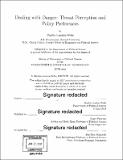Dealing with danger : threat perception and policy preferences
Author(s)
Landau-Wells, Marika
DownloadFull printable version (19.15Mb)
Alternative title
Threat perception and policy preferences
Other Contributors
Massachusetts Institute of Technology. Department of Political Science.
Advisor
Roger Petersen.
Terms of use
Metadata
Show full item recordAbstract
This dissertation develops and tests a new individual-level theory specifying the relationship between threat perception and policy preferences. The project takes a unified approach to studying the space of danger-mitigating political behaviors. It is designed to demonstrate that a single psychological model can apply to both citizens and elites and in both domestic and foreign policy issue areas. The first paper develops Threat-Heuristic Theory, a new individual-level model of the psychological processes linking the detection of danger to specific policy preferences for mitigating it. The paper presents a review of the literature in biology and cognitive science regarding evolved systems of threat perception and response, on which the theory draws. The paper demonstrates that the theory's core explanatory variable, threat classification, is not a proxy for other constructs already incorporated into political science. The paper also illustrates that the domain of complex dangers, characterized by low levels of agreement in threat classification, contains issues of interest to political science. The second paper applies the theory to explain variation in preferences for specific forms of immigration restriction in the U.S. The paper highlights the importance of understanding threat classification in order to move beyond explanations of pro/anti-immigrant sentiment towards a model that captures preferences for real-world policy options. The third paper applies the theory to a small number of elite policy-makers in order to explain their support for particular measures included in U.S. national security strategies of the early Cold War and of the first George W. Bush Administration. The paper demonstrates how "bad strategy' and problematic policy preferences can arise systematically through the operation of Threat-Heuristic Theory's psychological model and need not be solely explained by bureaucratic politics or error.
Description
Thesis: Ph. D., Massachusetts Institute of Technology, Department of Political Science, 2018. Cataloged from PDF version of thesis. Includes bibliographical references (pages 193-216).
Date issued
2018Department
Massachusetts Institute of Technology. Department of Political SciencePublisher
Massachusetts Institute of Technology
Keywords
Political Science.